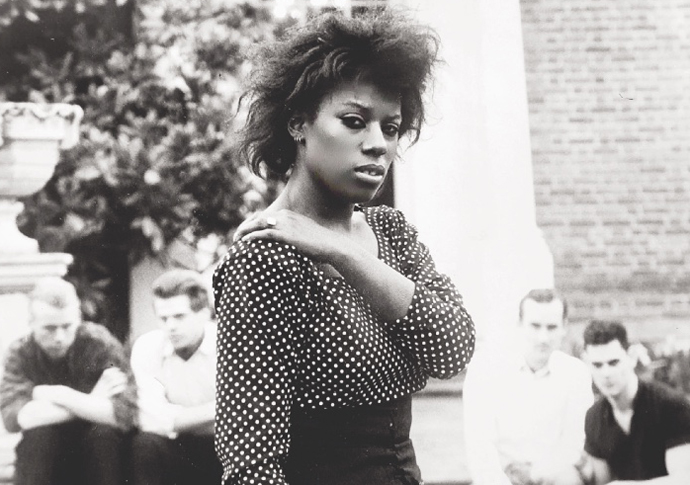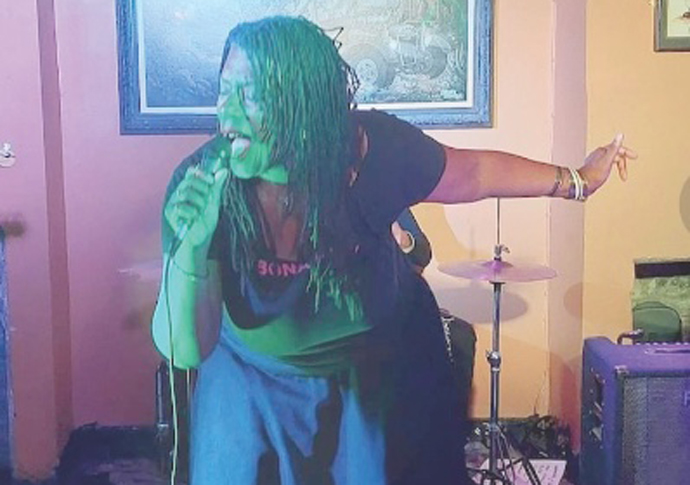Harrington: Cheers Chas!
Punk band pioneer recalls on those Soho nights it felt she that she could finally be herself
Friday, 11th October 2024

Chas Hines during her younger years in Bona-Rays
CHAS Hines had wanted to be in a band since her early teens, and she would go on to be one of the first black women to front a British punk band.
“It didn’t feel like a big deal at the time,” she told Harrington this week as Black History Month kicked off.
“I was just wanting to take my place doing something I loved. I wasn’t thinking that it would make a difference that I was female, or that I was black, or that I wasn’t a certain build, or didn’t have a certain hair texture.
“That kind of stuff did not cross my mind. It was almost like punk gave me permission to be myself.”
Ms Hines moved to London from her home in Surrey after finishing school, and began going to gigs four times a week – with Soho venues among her favourites in London.
She told me about one particularly memorable night out at the Marquee Club in Soho around the mid-1970s.
Echo & the Bunnymen were playing, but the audience were told the drummer had broken his thumb and the band could not play without him.
They were told the support band would play a double set, “it was a little-known group at the time, U2,” she told me.
Ms Hines day job – running financial documents between BBC offices in Cavendish Square and Shepherd’s Bush – meant she saw recordings of Top of the Pops and The Old Grey Whistle Test, watching David Bowie and Kate Bush perform.
But it was in 1978, while Ms Hines was singing to herself on a tube platform, that a stranger came over and asked if she wanted to try out for his friend’s band.
Ms Hines said: “I went up to Tufnell Park for an audition and it was just this guy on his own, he’d written some songs on his guitar. He was like, ‘you’re in’. And I was like, ‘I know’.”

Ms Hines back on stage in 2024
Two weeks later Ms Hines and her new bandmate, Tony Keating, recorded their first single, Poser, under the name Bona-Rays.
“It was just the most amazing feeling to be accepted, to be a black person and to be accepted by a group that were also marginalised,” Ms Hines said of her place in punk subculture.
But, while on a shoestring tour with the band, experiences of racism knocked her confidence.
At that time, Debbie Harry was the pop-star of the moment, and the bassist in Bona-Rays had a girlfriend who looked exactly like her.
“Sometimes she would come with us in the van and all the promoters assumed she was the singer,” Ms Hines recalled.
“That was ok, until they were really disappointed that I was the singer and there was a noticeable drop off in their attention to the band. That really hurt. As a black person you’re really attuned to these things.”
She added: “I don’t think I performed my best then, because I felt like I wasn’t fancied, I wasn’t taken care of, I wasn’t treated like an artist.”
The band broke up a few years later, and Ms Hines went on to work as a costume designer.
But, more than 40 years on, a serendipitous encounter with the owner of Islington’s oldest record shop over in Essex Road led Ms Hines to reform Bona-Rays, now with Flashback Records’ Mark Burgess on the bass.
Ms Hines told me it was “amazing to be back”.
“I don’t think there’s less racism today, but what there is more of is confidence in being my big, black self.
“The narrative was always: stay small, stay quiet, don’t get in my face. When I was younger I was so constrained, thinking about what other people were thinking, but I don’t care about that anymore.
“There is so much personal liberation in being yourself and not being afraid to be disliked.”
She added: “So going on stage now is wonderful fun. I’m 65 and I’m having the best time.”